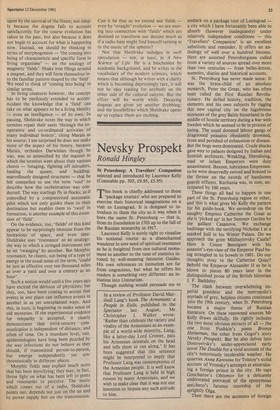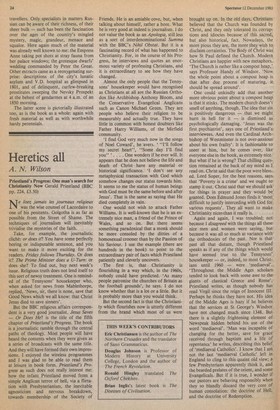Nevsky Prospekt
Ronald Hingley
St Petersburg: A Travellers' Companion selected and introduced by Laurence Kelly (Constable pp. 303, £9.95, £5.95) This book is chiefly addressed to those 1 'package tourists' who are prepared to exercise their historical imaginations on a visit to Leningrad. It is designed to introduce to them the city as it was when it bore the name St. Petersburg — that is, from its foundation in 1703 up to the fall of the Russian monarchy in 1917.
Laurence Kelly is surely right to visualise his notional tourist as a disenchanted wanderer in sore need of spiritual resonance as he is freighted from one cultural monument to another to the tune of statistics intoned by well-meaning lntourist Guides. His own references to Intourism are far from ungracious, but what he offers his readers is something very different: an initiation into Untourism.
Though nothing would persuade me to embark on a package tour of Leningrad — a city which I have fortunately been able to absorb (however inadequately) under relatively independent conditions — this 'Travellers' Companion' is an excellent substitute and reminder. It offers an anthology of well over a hundred blooms. Here are assorted Petersburgiana culled from dvariety of sources spread over more than two centuries — from belles-lettres, memoirs, diaries and historical accounts.
St. Petersburg has never made sense. It was the brain-child of an absolute monarch, Peter the Great, who has often been called the First Russian Revolutionary. He defied history, tradition, the elements and his own subjects by rigging this new capital city on the lugubrious morasses of the grey Baltic hinterland in the middle of hostile territory during a war with Sweden which he seemed to be in process of losing. The usual doomed labour gangs of dragooned peasants obediently drowned, froze and perished of exhaustion or disease. But the bogs were dominated. Crude shacks gave way to palaces designed by Italian and Scottish architects. Weakling, liberalising, mad or infant Emperors were duly assassinated. Buxom, lubricious Empressesto-be were deservedly swived and hoisted to the throne on the swords of handsome guards officers. Ruritania was, in sum, anticipated by 100 years.
These things all had to happen in one part of the St. Petersburg region or other, and this is what gives Mr Kelly the pattern for his guide-book. We eavesdrop on the naughty Empress Catherine the Great as she is 'picked up' in her Summer Garden by the gallant Casanova. We exchange badinage with the terrifying Nicholas I at a masked ball in his Winter Palace. Do we approach the grim Mikhaylovsky Castle? Here is Count Bennigsen with his assassin's-eye-view of the Emperor Paul being strangled in its bowels in 1801. Do our thoughts stray to the Catherine Quay? Behold the Emperor Alexander II as he is blown to pieces 80 years later in the distinguished prose of the British historian J. F. Baddeley.
The clash between overwhelming imperial grandeur and the metropolis's myriads of grey, helpless citizens continued into the 19th century, when St. Petersburg became a major theme of Russian literature. On these renowned sources Mr Kelly draws skilfully. He rightly includes the two most obvious extracts of all — the one from Pushkin's poem Bronze Horseman, the other from Gogol's story Nevsky Prospekt. But he also delves into Dostoyevsky's under-appreciated early novel The Double for a vivid account of the city's notoriously intolerable weather. He quarries Anna Karen ma for Tolstoy's stolid account of Vronsky's attempts at entertaining a foreign prince in the city. He taps Goncharov's Oblomov for a delicately understated portrayal of the eponymous anti-hero's fatuous courtship of the sprightly Olga.
Then there are the accounts of foreign travellers. Only specialists in matters Russian can be aware of their richness, of their sheer bulk — such has been the fascination over the ages of the country's mingled mystery, magic, grandeur, menace and squalor. Here again much of the material was already well known to me: the Empress Anne taking pot shots at stray fauna from her palace windows; the grotesque dwarfs' wedding commanded by Peter the Great. Other extracts came as a reoxygenating surprise: descriptions of the city's lunatic asylum and V.D. hospital as glimpsed in 1801, and of delinquent, curfew-breaking prostitutes sweeping the Nevsky Prospekt at the behest of gendarmes at 4 a.m. of an 1850 morning.
The latter scene is pictorially illustrated too, as is the book as a whole: again with fresh material as well as with worthwhile hardy perennials.







































 Previous page
Previous page